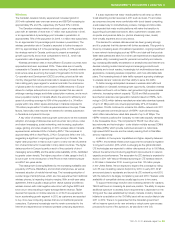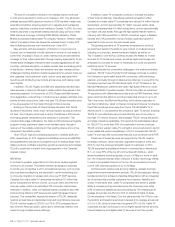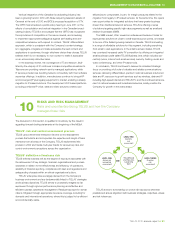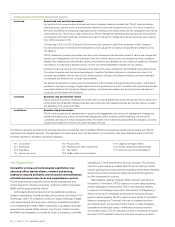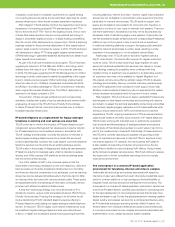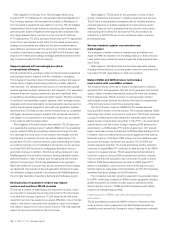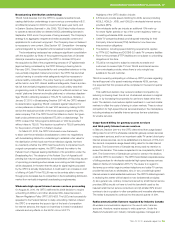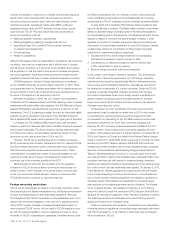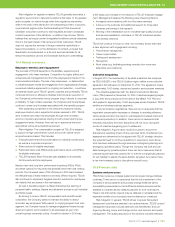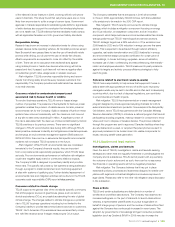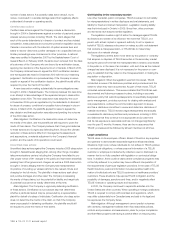Telus 2010 Annual Report Download - page 103
Download and view the complete annual report
Please find page 103 of the 2010 Telus annual report below. You can navigate through the pages in the report by either clicking on the pages listed below, or by using the keyword search tool below to find specific information within the annual report.
TELUS 2010 annual report . 99
Highlights of the CRTC decision include:
.ILECs are to provide speed-matching for ADSL service (including
ADSL2, ADSL2+, VDSL and VDSL2) to wholesale Internet service
providers (ISPs)
.New wholesale tariffs can include an additional 10% mark-up
for newer higher speeds on top of the current regulatory mark-up
for existing wholesale ADSL services
.Cable-TV companies already provide speed-matching for their
third-party Internet access (TPIA) facilities but now have new
interconnection obligations
.The decision, including speed-matching requirements, applies
to FTTN ILEC facilities and DOCSIS 3.0 cable-TV company facilities
.Fibre-to-the-premises (FTTP) facilities are not subject to unbundling
obligations at this time
.TELUS is not required to adapt its networks to enable end-
customers to receive Optik TV from TELUS and Internet service
from a wholesale provider, where there is only a single loop
available to the end customer.
TELUS is currently participating in a follow-up CRTC process regarding
the tariff approval of its speed-matching wholesale ADSL services.
It is expected that this process will be completed in the second quarter
of 2011.
This reaffirmed decision may reduce broadband competition by
reducing or slowing down the roll-out of advanced services in marginal
areas, or by increasing the propensity for carriers to lease rather than
build. The decision could reduce capital investment in rural and smaller
markets to offset the costs of sharing in urban markets. There is robust
competition for high-speed Internet services already in the marketplace,
including wireless and satellite Internet services that are substitutes
for wireline services.
Usage-based billing for gateway access services
and third-party Internet access services
In Telecom Decision 2011-44, the CRTC determined that usage-based
billing rates for an ILEC’s wholesale residential gateway access services
or equivalent services, and for an incumbent cable-TV carrier’s third-party
Internet access services, are to be established at a discount of 15% from
the carrier’s comparable usage-based billing rates for its retail Internet
services. The Government of Canada has announced its intention to
review this decision. This review is expected to be completed by March 1,
2011. The Government of Canada can uphold or overturn the decision,
or ask the CRTC to reconsider it. The CRTC has initiated a separate review
of billing practices for wholesale residential high-speed access services
(Telecom Notice of Consultation 2011-77). The review is in regard to
the terms upon which large incumbent telephone and cable-TV carriers
pro
vide their services to wholesalers, who, in turn, provide high-speed
Internet access to retail residential customers. The CRTC’s stated approach
in reviewing this matter will be based on two fundamental principles:
(1) as a general rule, ordinary consumers served by small Internet service
providers (ISPs) should not have to fund the bandwidth used by the
heaviest retail Internet service consumers; and (2) smaller ISPs should
continue to be in a position to offer competitive and innovative alternatives.
The review is expected to continue into the second quarter of 2011.
Radiocommunication licences regulated by Industry Canada
All wireless communications depend on the use of radio transmis-
sions and, therefore, require access to radio spectrum. Under the
Radiocommunication Act, Industry Canada regulates, manages and
MANAGEMENT’S DISCUSSION & ANALYSIS: 10
Broadcasting distribution undertakings
TELUS holds licences from the CRTC to operate terrestrial broad-
casting distribution undertakings to serve various communities in B.C.
and Alberta (renewed in 2009 for a second full seven-year term), and
in Eastern Quebec (licensed in July 2005). TELUS also holds a licence
to operate a national video-on-demand (VOD) undertaking (licensed in
September 2003 and in the process of being renewed). The Company’s
strategy is to aggregate, integrate and make accessible content and
applications for customers’ enjoyment. The Company does not believe it
is necessary to own content. (See Section 10.1 Competition – Increasing
vertical integration by competitors into broadcast content ownership.)
The broadcasting landscape has undergone significant consolidation
with the acquisition by Shaw of the programming services of Canwest
Global (a transaction approved by the CRTC in October 2010) and
the acquisition by Bell of the programming services of CTVglobemedia
(approval being considered by the CRTC following a hearing held in
February 2011). Given the potential for anti-competitive behaviour in this
new vertically integrated market environment, the CRTC has launched
a policy hearing to consider what safeguards might be necessary to
ensure healthy competition. The policy hearing on vertical integration
will be held in June 2011. Absent additional safeguards, there is a poten-
tial risk that vertically integrated competitors could unfairly raise their
programming costs to TELUS and/or attempt to withhold content on “new
media” platforms (Internet and mobile platforms) or otherwise disadvan-
tage TELUS in attracting wireless or TELUS TV customers. Notably, on
January 27, 2011, in Broadcasting Decision 2011-48, the CRTC released
its determination regarding TELUS’ complaint against Videotron for
undue preference conferred to its own VOD service by making its VOD
service the exclusive provider of the most popular programming of its
sister company TVA. The CRTC found that Videotron had in fact given
itself undue preference and subjected TELUS to a disadvantage. The
CRTC ordered that TVA programs distributed on VOD be provided
without delay to TELUS. This decision is positive for TELUS particularly
for the provision of Optik TV in Eastern Quebec.
On March 22, 2010, the CRTC introduced a new framework
to allow over-the-air television broadcasters to enter into negotiations
with broadcasting distribution undertakings to establish a fair value for
the distribution of their local over-the-air television signals. As there
is uncertainty whether the CRTC has the authority to implement such
a signal compensation regime, the CRTC referred the matter to the
Federal Court of Appeal seeking clarification of its jurisdiction under the
Broadcasting Act. The decision of the Federal Court of Appeal is still
pending but may be superseded by a reconsideration of this policy as part
of upcoming proceedings where issues surrounding vertical integration
will be discussed. In the event that the value for signal regime proposed
by the CRTC is actually implemented, it could lead to an increase in cost
of offering of Optik TV that TELUS may not be entirely able to recover
through price increases due to competition in the broadcasting distribution
market from vertically integrated broadcasting conglomerates.
Wholesale high-speed Internet access services proceeding
On August 30, 2010, the CRTC reaffirmed its 2008 decision to require
unbundling of ADSL2+ and other advanced DSL-based services in
Telecom Regulatory Policy CRTC 2010-632. The ILECs had successfully
appealed to the Federal Cabinet to delay unbundling. Cabinet ordered
the CRTC to re-examine the issue in light of the level of competition
for Internet services, the impact on incentives to invest in broadband
networks and any effects on the ILECs’ roll-out of IP TV.


